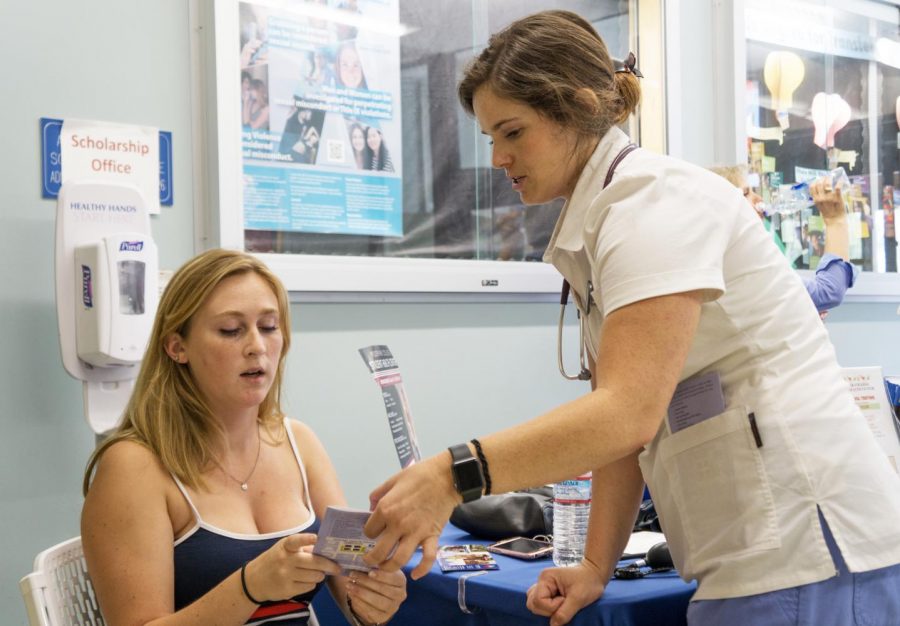Health Center offering cholesterol testing and flu vaccinations in September
Sandra Daughenhaugh, 20, kinesiology major (left) is instructed on keeping healthy blood pressure levels by Rebecca Pancake, 29, nursing student. Students got the opportunity to measure their blood pressure and body fat in Fountain Hall as part of the Health Center’s Heart Health Day on Aug. 29 and 30.
September 5, 2017
The Health Center is offering cholesterol testing on Sept. 12 and flu vaccinations throughout the month of September. Students learned about these services and got the opportunity to measure their blood pressure and body fat recently from a demonstration in Fountain Hall.
“Hypertension and heart disease are kind of silent killers…high cholesterol is often present in college age students and they don’t know,” said health educator Allison Barton. “Then by the time they get checked the damage has been done.”
Cholesterol testing helps students and faculty evaluate their risk for heart disease and stroke. Flu vaccinations allow the build up of antibodies against the seasonal flu virus. This protects not only the recipient of the vaccine from infection, but also the community around them. The Health Center recorded 4,781 students coming in for medical and mental health service in 2016-2017, compared to 4,542 during the previous academic year.
Free blood pressure and body fat measurements were offered Aug. 29 and 30 as part of the Health Center’s Heart Health Day. The event offered passing students the opportunity to learn about upcoming Health Center services, also allowing nursing students and personal trainer interns to earn volunteer hours and practice taking these measurements.
“The more practice, the better. It’s always nice to get involved in the school,” said Rebecca Pancake, 29, nursing student. “A lot of people don’t know we have a nursing program so it actually opens up a little bit of that.”
Flu vaccines are being offered by the Health Center for $20 throughout the month of September while supplies last. Cholesterol testing will be offered from 8 a.m. to 9:30 a.m. on Sept. 12 and will cost students $12. Appointments are required for both services.
“If you get the flu you are kind of down for the count for about two weeks a lot of the time,” said Barton. “Most students are not able to recover from missing that much class. They recover physically but academically they might not be able to recover.”
While the the Health Center does not charge to see any of its providers, they do charge for some lab work and medications. The Health Center is nonprofit and funded by the $20 health fee required during enrollment. This allows the Center to focus on keeping costs low and accessible to students, according to Health Center coordinator Sharon Manakas.
“One thing about medical care in the community is that sometimes it’s not very easy to access,” said Manakas. “Students have high deductibles and that must be met before their insurance can kick in and pay for it. So here every student pays a health fee. So there is no charge to see any of our providers here.”
Students who take advantage of the cholesterol testing will have to fast for 12 hours before coming in for testing. Then they will have to return to the Health Center the following week to review their lab results for any abnormalities. Problems can arise if there is more cholesterol in the body than it has use for. Over time, this buildup of cholesterol can attach to the walls of the arteries, damaging them or even stopping blood flow.
“It’s a good time when you’re young to see whether or not your cholesterol levels are in line, and if they are out of line what diet changes you can make, what are you doing with your exercise part of your life, so you can start to make those changes and there isn’t all the plaque build up in your arteries as you start to get older,” said Manakas.
Cholesterol, a waxy-like fat produced by the liver, is used by the body to help make hormones and build healthy cell membranes. High levels of cholesterol usually refers to one of two types of cholesterol – low density lipoproteins (LDL) which stick to the walls of arteries. There are also high density lipoproteins (HDL) which are actually beneficial to the body, as they don’t build up, and have the ability to remove LDL cholesterol.
According to Manakas, each student will receive a handout that explains their lab results. In addition to testing cholesterol, the Health Center will also check blood glucose levels for any sign of diabetes. If the results indicate the presence of high cholesterol and a signs of diabetes, the Health Center will conduct follow up tests and offer nutritional advice.
“A lot of our students have parents that have high blood pressure, high cholesterol, had strokes or heart attacks, so we are really trying to educate them on now is the time to make the changes that you can,” said Manakas.









